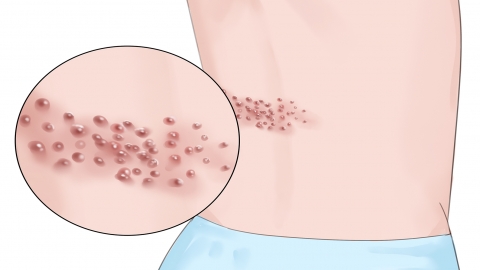How to effectively treat herpes zoster (snake-like rash)
"Snake sores" usually refer to herpes zoster. Under normal circumstances, herpes zoster may be related to factors such as age, psychological stress, diabetes, nephrotic syndrome, systemic lupus erythematosus, and others. Depending on the situation, general treatment, psychotherapy, and medication may be used for treatment or symptom relief. It is recommended to seek timely medical attention, identify the underlying cause, and undergo symptomatic treatment under a doctor's guidance. Detailed analysis is as follows:

1. Age Factors
As people age, immune system function gradually weakens, increasing the risk of developing "snake sores," which may be accompanied by general malaise and fatigue. It is recommended to receive the herpes zoster vaccine to prevent disease occurrence.
2. Psychological Stress
Prolonged psychological stress and emotional fluctuations can also weaken the immune system, allowing dormant viruses the opportunity to reactivate, leading to herpes zoster, which may be accompanied by anxiety and depression. Patients may benefit from psychological counseling or interventions to help relieve stress and improve emotional well-being.
3. Diabetes
Poor blood sugar control may lead to a decline in immunity, thereby activating the varicella-zoster virus and triggering herpes zoster, which may be accompanied by increased thirst and frequent urination. Patients may follow medical advice to use medications such as acarbose capsules, glimepiride tablets, or gliquidone tablets for treatment.
4. Nephrotic Syndrome
Due to impaired kidney function, metabolic waste and toxins may accumulate in the body, affecting normal immune system function and triggering herpes zoster, which may be accompanied by edema and proteinuria. Patients may follow medical advice to use medications such as hydrochlorothiazide tablets, furosemide tablets, benazepril hydrochloride tablets for treatment.
5. Systemic Lupus Erythematosus
This may be related to abnormal activation of the immune system, leading to immune dysfunction and reactivation of latent varicella-zoster virus, thereby causing herpes zoster, which may be accompanied by fever and rash. Patients may use medications such as hydroxychloroquine sulfate tablets, azathioprine tablets, prednisone acetate tablets under a doctor's guidance for treatment.
Patients should maintain a positive mindset, engage in regular exercise, and enhance their immunity, which can aid in recovery from the condition.





